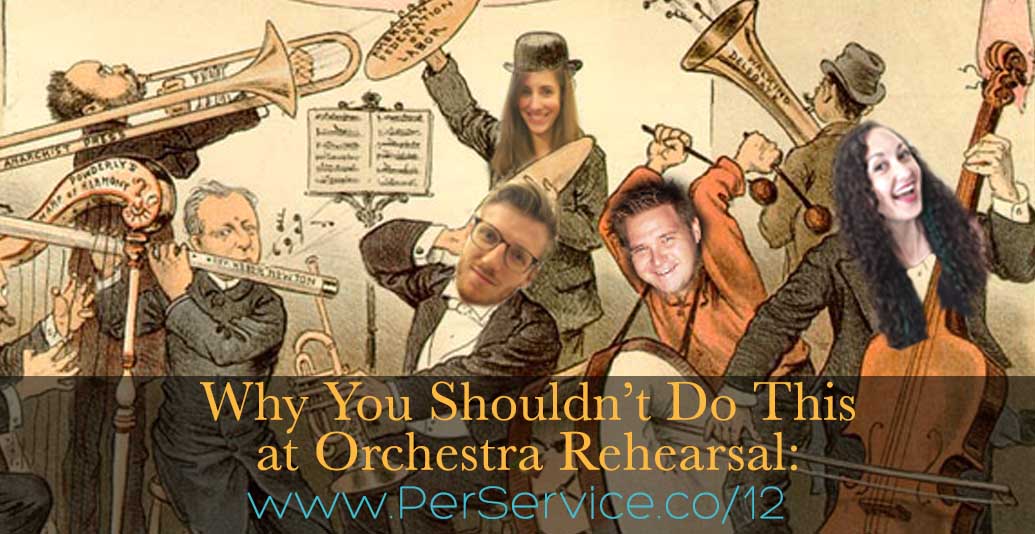It’s back to school and back to orchestra season time of year. So in this episode we’re covering one of the biggest areas that affects overall enjoyment and success in orchestra: Etiquette.
Rather than just a list of rules though, we see them more as “guidelines” (as cheesy as that sounds). Because, for almost every “rule” we find a time when we’ve broken it. Because some of these we learned the hard way, and hope you don’t make the same mistake as well:
Listen to the Podcast Below:
One of the most common AND most preventable frustrations often come from your colleagues in the orchestra, who are rude, inconsiderate, or just don’t know any better.
There’s not much you can do to stop their annoying behavior, (except maybe sharing this post with them…?)
But before you start pointing the finger, check out this list to make sure there aren’t some things that you’re doing that could be rude or annoying those around you.
Before Rehearsal:
0. Be there.
(To be early is to be “on time.” To be “on time” is to be late. To be late is to be left.)
1. Never sight read in rehearsal. Prepare your part in advance.
2. Write in cues, bowings, or other notes before the first rehearsal, but do not make the part illegible for your stand-partner.
3. If you are on the outside, put your fingerings on the top line. Inside players: below the line.
During Rehearsal:
4. Show up early to rehearsal to get your instruments together, and be warmed up at least 10 minutes before the “A” is given.
5. If you were given originals to practice, be on stage at least 15min before the first rehearsal to allow your standpartner sufficient time to transfer their fingerings to the part. If you were given photocopies, transfer your fingerings if you need them to the part you will be performing from.
6. Have good hygiene, keep your shoes on, wear appropriate clothing, etc.
7. Do not noticeably tap your foot or conduct along. If you can’t help yourself, at least tap your heel, (or best yet: Just your big toe inside your shoe)
8. Do not turn around and look at the people behind you, or the winds and brass while they are playing. It’s disconcerting.
9. Do not tap/applaud/shuffle for every solo that section colleague plays. Save it for when it really means something or better yet… stay still and just give them your positive words afterwards.
10. Do not tell someone they sound good if they do not deserve the praise.
11. Never complain about your reeds, strings, bow hair etc.
12. Practice only your own part on stage before rehearsal starts… never play passages from another person’s part or excerpts from different music, and especially not your concerto!
13. Avoid “silent practicing” by tapping, plucking, playing sul-tasto, or air bowing. It’s noisy, annoying to your colleagues, and lets everyone know you didn’t learn your part.
14. If the conductor asks to start in the middle of a high phrase, do not find your note by playing it before the downbeat. Find it silently and pluck the string once, if you really need to check.
15. If you are concertmaster or a principal, avoid demonstrating to your section if a verbal description is more efficient. If it’s clearer to demonstrate, that’s ok, but be cautious about hijacking everyone’s rehearsal time just because you have the authority to do so.
16. Avoid asking questions about notes/rhythm/misprints during rehearsal – this wastes valuable rehearsal time. Check the score with the conductor during breaks or after rehearsal. And if you’re a section player: Don’t ask a question from the back-ask your principal:
17. Your pencil is your best friend…. Do not make the same mistake twice because you “forgot.”
18. When a conductor speaks to you, always acknowledge by making direct eye contact and possibly a nod “yes.”
19. Remember that every time you are in public, an impression is made: good or bad… This applies both to the music you play and the statements you make to your colleagues.
20. Be direct and friendly about fixing pitches or rhythm. Do not be manipulative about your words.
21. The only conversations during rehearsals should be about issues regarding the music, and only at the appropriate times.
22. Pass information or changes all the way to the back of the last stand (of string sections)
23. Do not pack up before the end of rehearsal…. you still might have more to play.
24. If the conductor says: “That’s it, unless you have anything you’d like to go over again?”
KEEP YOUR MOUTH SHUT!
Unless..
a) You are the concertmaster
b) You are a principal, that was the last rehearsal, and you know that there will be definitely be a train-wreck in the concert if you don’t fix it.
c) You want to experience the easiest and quickest way to make an entire orchestra angry at you.
During Rehearsal or a Concert:
25. Always double check rehearsal/performance times, locations, and dress code.
26. For string players, when the “A” is given: do not start tuning before the concertmaster starts.
27. Keep perfume and cologne to a minimum – many will appreciate none at all.
28. Have your mute ready if the repertoire asks for it. And “grease it” if it makes a lot of noise when putting it on. (Some body sweat will usually do the job).
29. If you don’t have a mute, make one with a dollar bill or a paper clip.
30. Be aware and sensitive to other people’s line of sight to the conductor. Hats are generally discouraged, and be reasonable with up-do’s, pony-tails, or buns, if they are obstructing someone’s line of sight.
31. Do not yawn or “buzz” your lips audibly if you are tired.
32. Avoid nervous repetitive actions: Looking at reed, adjusting seat/stand, instrument adjustments, fixing your hair, or other actions that draw attention to yourself.
33. Your non-musical accessories (phone, keys, etc.) belong in your case/purse/man-bag, not on the shelf of your stand waiting to tip over and clatter to the floor.
34. Do not turn a page during silence. But if you must: lift the corner of the page so that it does not scrape against the stand.
35. Do not overly flourish unless it is the end of the movement/piece.
36. Swab out discreetly and not if the person next to you is playing a solo. (for wind players obviously)
During a Concert:
37. Do not cross you legs on stage in a concert.
38. Leave your seat immediately when switching pieces or seats… swab out and pack up later. The next players want to play a few notes before tuning!
39. At the end of a piece, do not finish playing and put your instrument down before the conductor has concluded.
After a Concert:
40. Do not start bitching or complaining about anything until you have left the building. Even then, make sure you know your audience and that what you say won’t offend them or someone they respect.
Links we Mentioned:
Il Divo (Yes, they’re real): “Unbreak My Heart” (originally recorded by Toni Braxton)
Talking Dog Video:
Becoming our patron means that you’re pledging the monthly dollar amount of your choice to support our show. In return, Patreon contributors will receive exclusive access to:
- Behind the scenes content (what goes on when we’re not on our best behavior)
- Bonus content (all the good stuff that doesn’t make it into the final product due to time constraints)
- PLUS we’ll publicly thank you in person on air for your support.
It’s basically a monthly subscription with all sorts of cool perks. Most importantly, you can adjust your pledge anytime you like!
Just like Haydn needed Prince Esterházy and libraries needed Andrew Carnegie, WE need YOU to be our Patron so we can keep creating great, free, inspiring shows.
Add Your Voice:
Either written or recorded
What are some of the things you do to add Balance and Routine to your life?






